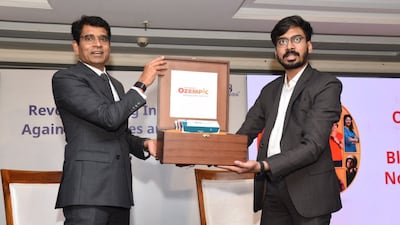India
India’s budget backs plans to scale production of biologics and biosimilars, shore up its clinical trials network and strengthen the regulatory framework. Customs duty exemptions given to several big pharma therapies, including those of Novartis and Takeda.
Strides Pharma aims for higher revenues from Canada and other ex-US markets while waiting for controlled substances to ramp up gradually under the leadership of ex-Apotex CEO Peter Hardwick. However, a cut in US funding for the Global Fund is hurting the company and its competitors.
Sun’s founder reinforces the firm’s M&A strategy, indicating that it is "comfortable raising debt" if required, but shares no specific comment on the speculated interest in Organon. The Indian company also has "sufficient supplies" to meet demand for generic semaglutide in India post LoE.
Huge opportunities for OTC therapies loom in India, as consumerization brings structural reset in healthcare, as per a new report by EY-Parthenon. Success stories on Rx-to-OTC transition augur well for pharma, but a predictable regulatory roadmap will be pivotal for sustainable growth.
From a biofoundry network and pharma industry backed AI research organization to a small-molecule repurposed drug in Duchenne’s muscular dystrophy, experts discuss a number of advances underway as India seeks to move up the innovation ladder.
Conclusion of India-EU talks sets ground for a free trade agreement to cut pharma tariffs, in turn lowering the cost for novel drugs like Novo’s obesity treatment Wegovy, though an investment protection agreement – likely influencing data exclusivity – will be concluded later.
Lanreotide supply issues cloud Cipla’s Q3 FY26 earnings, with impact seen in Q4 as well, though pipeline assets augur well for US growth continuity. Perpetual rights to Novartis’s Galvus effective Jan 1, seen adding momentum to India diabetes gains.
Dr Reddy’s gears for semaglutide debut across markets, including India and Canada, where Novo Nordisk has second brands of the GLP-1 agonist potentially ready. Can the Indian group close out compliance queries from the Canadian regulator soon?
BMS tells Scrip it will continue to seek legal recourse even as Zydus Lifesciences launches the world’s first cut-price nivolumab biosimilar in India following a Delhi High Court division bench ruling in favor of the Indian company
Zydus is to gain from a world-first nod for a Menkes disease drug in the US amid speculation on a deal to acquire Ardelyx. Scrip examines how Zycubo approval, Agenus’s oncology BOT/BAL combination progress and a Formycon partnership help the Indian major
Sun terms reports of acquisitive interest in Organon as "speculative," at least for now. Bankers see a potential transaction fit the profile of a 'typical’ Sun deal, which if it occurs also catapults the Indian firm’s foray into biosimilars.
While the regulatory environment for vaccines sours in the US, Valneva tells Scrip it is mulling an Asia hub and finalizing a strategy - that includes partnerships - for its marketed and pipeline products. Could it consider India or China as a new regional center?
What is the strategic intent behind Aurobindo’s moves to settle a Galafold patent dispute with Amicus Therapeutics, acquire the non-oncology business of compatriot Khandelwal Labs and get full control of a Chinese JV with Shandong Luoxin?
2025 saw star products debut in India as foreign firms doubled down on high-value, IP-protected therapies. Experts tell Scrip the top 10 cities in the country can now sustain “US/EU-style” specialty launches.
Industry veterans put themselves in Novo’s shoes, suggesting pricing manoeuvres and tactical measures to blunt competition in India post semaglutide’s LOE in 2026. There’s also court action to watch.
Cipla to distribute a diverse set of products from Pfizer in India, signaling, more widely, big pharma’s evolving playbook in the country.
Ozempic debuts in India, priced in the ‘affordable zone’ for the country's population, with Novo Nordisk hoping the blockbuster drug can hold its own post impending loss of exclusivity in the country next year.
The consolidation of Biocon-BBL is expected to unlock value, deliver operational synergies and provides BBL’s minority shareholders an 'earlier liquidity event'. Investor Viatris also signals accelerated expiration of biosimilars non-compete restrictions.
Sun launches tildrakizumab, its star psoriasis therapy in India seven years after US FDA approval at what’s seen as a carefully calibrated price point. Can it ruffle entrenched products like secukinumab?
After AI’s magic wand status, it's now come to Google and Open AI CEOs talking of the likelihood of a bubble burst. In this interview, Parexel’s India head discusses how to view returns on such investments, the CRO’s own use cases and the US FDA’s keenness on transparency and open dialogue.




















